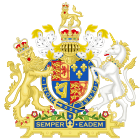Gaming Act 1710 facts for kids

|
|
| Long title | An Act for better preventing of excessive and deceitful Gaming. |
|---|---|
| Citation | 9 Ann. c. 19 (Ruffhead c. 14) |
| Dates | |
| Royal assent | 16 May 1711 |
| Other legislation | |
| Repealed by | Gambling Act 2005 |
|
Status: Repealed
|
|
| Revised text of statute as amended | |
The Gaming Act 1710 was an important law passed by the Parliament of Great Britain. This law aimed to control and prevent too much or unfair gambling. It was officially called "An Act for better preventing of excessive and deceitful Gaming."
This Act was a key part of how gambling was managed in Great Britain for many years. It showed that even a long time ago, people were thinking about how to make gambling fair.
Contents
What Was the Gaming Act 1710?
The Gaming Act 1710 was a law created in 1710. Its main goal was to stop people from gambling too much. It also wanted to prevent cheating in games. This law was one of the first big steps to regulate gambling in Britain.
Why Was This Law Created?
In the early 1700s, gambling was very popular. However, it often led to problems like debt and cheating. The government wanted to make sure that gambling was done fairly. They also wanted to protect people from losing too much money. This Act was a way to bring some order to the world of games and bets.
How Did the Law Change Over Time?
Over the years, society and laws changed a lot. The Gaming Act 1710 became less important as new laws were made. It was mostly replaced by the Gaming Act 1968. This newer law updated how gambling was controlled.
Finally, the entire Gaming Act of 1710 was officially cancelled. This happened when the Gambling Act 2005 was passed. The 2005 Act brought in completely new rules for gambling in the United Kingdom. This meant the old 1710 law was no longer needed.
See also
- History of gambling in the United Kingdom
 | Roy Wilkins |
 | John Lewis |
 | Linda Carol Brown |

